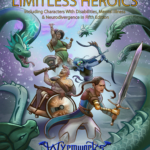Diabetes

You need to watch what you eat, when you eat it, and how much you eat to avoid symptoms such as thirst, weight loss, fatigue, blurred vision, or numbness in the hands and feet. Choose or roll on the following table.
| d10 | Effect |
|---|---|
| 1–4 | Hyperglycemia |
| 5–6 | Hypoglycemia |
| 7–10 | Both |
Hyperglycemia. If you eat too many carbohydrates in a short amount of time (e.g., a meal with more than a serving of grains, more than one alcohol drink, or more than one sweet food serving), you must succeed on a DC 10 + (IE) Constitution saving throw or become hyperglycemic and add 1d4 of the following experiences until you take a short rest: Nausea, Shortness of Breath, Weakness, Confusion, Body Pain (Abdominal). Roll for IE for each. Failure to take a short rest will increase the IE of each experience every hour and add an additional experience from the list. Once one of the added experiences exceeds IE 4, you enter a Coma.
Hypoglycemia. If you eat too few carbohydrates (you must eat at least a snack every three hours or less) or drink alcohol (yes, it can work either way) you must succeed on a DC 10 + (IE) Constitution saving throw every minute or become hypoglycemic and obtain one of the following traits, cumulative until you succeed on the saving throw: Confusion, Fainting, Agitation, Tremor, or Vertigo, which last until you get a serving of carbohydrates.
Real-world Examples
Diabetes, Polycystic Ovary Syndrome
Assistive Options
Closely monitoring your diet is the key to managing this, and allies who help when asked are invaluable.
Magical Assistance
The Goodberry spell, if used without other foods or drinks except for water, will maintain blood sugar for the duration of the spell.